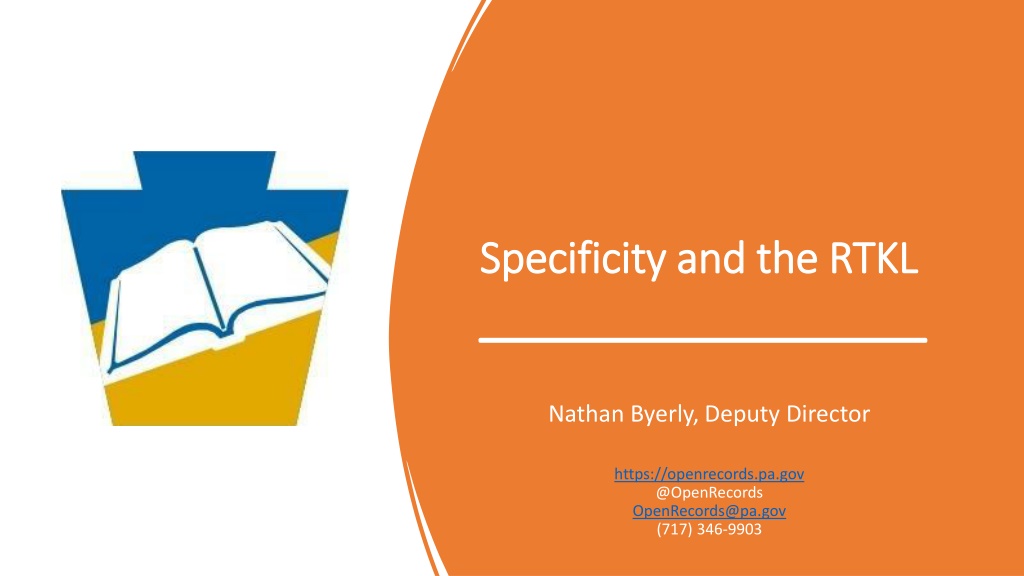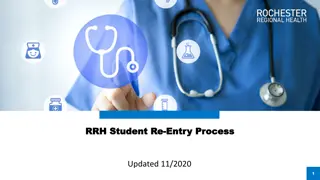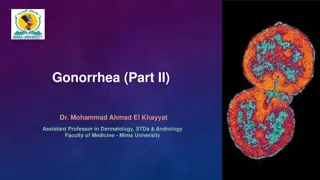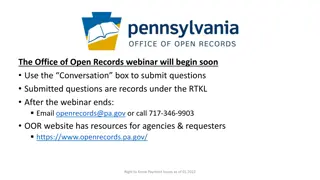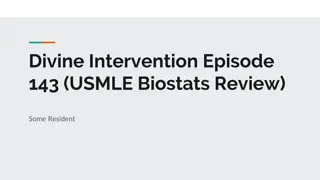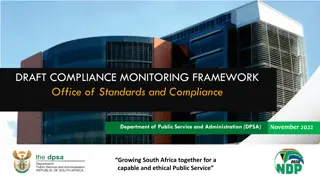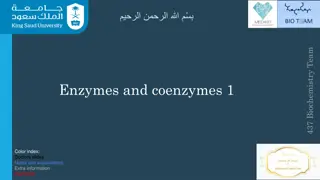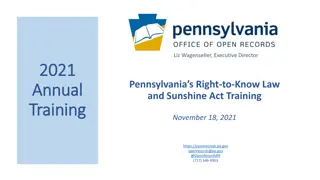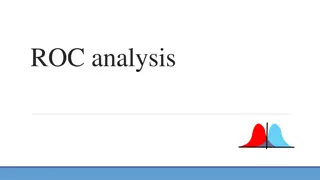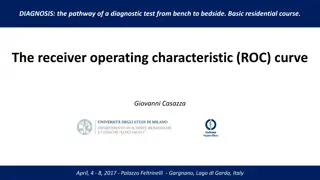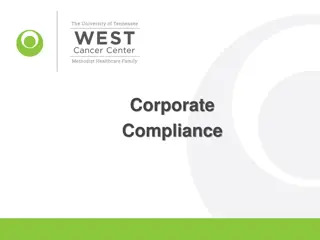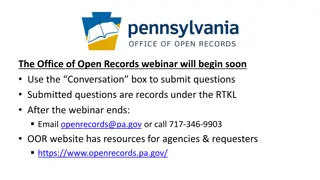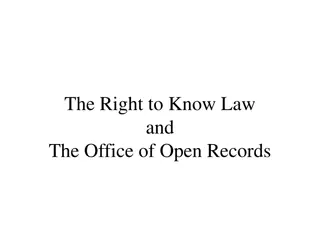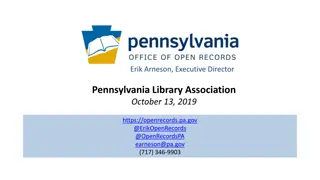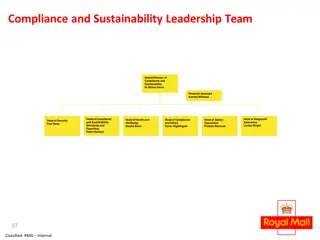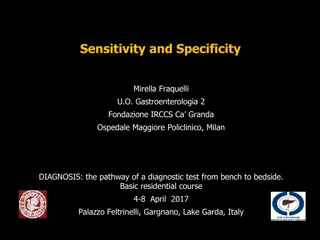Understanding Specificity and Compliance with RTKL
Explore the importance of specificity in requests under the Right-to-Know Law (RTKL). Learn about the legal factors and tests used to determine request adequacy, the need for clear identification of records sought, and considerations regarding burden on the agency. Also, understand that compliance with RTKL is a statutory duty akin to other responsibilities.
Download Presentation

Please find below an Image/Link to download the presentation.
The content on the website is provided AS IS for your information and personal use only. It may not be sold, licensed, or shared on other websites without obtaining consent from the author. Download presentation by click this link. If you encounter any issues during the download, it is possible that the publisher has removed the file from their server.
E N D
Presentation Transcript
Specificity and the RTKL Specificity and the RTKL Nathan Byerly, Deputy Director https://openrecords.pa.gov @OpenRecords OpenRecords@pa.gov (717) 346-9903
Disclaimers This presentation is not legal advice and not binding authority Definitive answers may not always exist reasonable minds may differ Facts of each individual case are very important context sensitive case by case basis Parts of presentation will overlap and repeat Specificity Specificity Goal To give you some tips and discuss the legal factors and three-part test used by OOR and the courts in determining whether a request is sufficiently specific To give you the tools to apply the relevant test factors and reach a reasonable conclusion or draft a reasonable request that is specific To give you additional resources To highlight the importance of records management
Use common sense Be polite Don t unnecessarily complicate the process General General Observations Observations
Section 703: A written request should identify or describe the records sought with sufficient specificity to enable the agency to ascertain which records are being requested and shall include the name and address to which the agency should address its response Purpose of specificity Do you know what they are requesting what records/information do they want The central question in evaluating the adequacy of a request is whether the request sufficiently informs an agency of the records requested. Purpose of Purpose of Specificity Specificity
Burdensome (volume) does not equate to insufficiently specific but may be a factor How much work (burden) is it to the agency? Why is it that much work/burden? From the number of records requested? From how the records are organized and maintained? From another cause? General General Observations Observations
Compliance with RTKL is a statutory responsibility/duty just like other responsibilities/duties Education, safety, regulation, oversight, parks and recreation services, police and fire departments, housing services, emergency medical services, municipal courts, transportation services (including public transportation), and public works (streets, sewers, snow removal, signage, and so forth) General General Observations Observations A request may be sufficiently specific even though it requests broad categories of records Generally, the bigger the agency, the greater need for specificity
Use of the word all does not render automatically insufficiently specific but not limited to and any and all do raise specificity questions A request can be partially specific Records can be given without waving the lack of specificity argument Example: Any and all records, files, or manual(s), communication(s) of any kind [related to vehicle stops]." Manual(s) is only part that is specific Pa. State Police v. Office of Open Records, 995 A.2d 515, 516 (Pa. Commw. Ct. 2010) General General Observations Observations
Three-part factoring test Dept. of Education v. Pitt. Post Gazette, 119 A.3d 1121 (Pa.Cmwlth. 2015) Request: all of the emails of the Acting Secretary of Education as they pertain to the performance of her duties as Acting Secretary since she was appointed on Aug. 23, 2013 to date (Aug. 5, 2014) Subject matter Must identify the transaction or activity of the agency for which the record is sought Should provide a context to narrow the search Scope of documents Must identify a discrete group of documents either by type or recipient Timeframe for which records sought (most fluid of 3) Should identify a finite period of time Not a bright line test requiring that all elements be present flexibility The three factors together considered to together should reveal a clearly defined universe of docs The Three The Three- - Part Test Part Test
Describes a transaction, incident, activity, event, topic, action or other agency business that is contained in, discussed in, or relates to the records requested An open-ended request that gives an agency little guidance regarding what to look for may be so burdensome that it will be considered overly broad Specificity must be construed in the request s context rather than envisioning everything that the request might conceivably encompass There are no judgments to be made as to whether the documents are 'related' to the request Subject Subject Matter Matter
The request should explain the specific type or kind of records you are requesting. (e.g., e-mails, reports, formal decisions, video footage, etc.) The request should seek records by naming the recipient(s) and/or sender(s). (where possible) Scope Scope
The request should identify a finite period of time. If that finite period of time is lengthy, does the rest of the request allow the agency to identify the specific records/information you are requesting? If there is no timeframe, does the rest of the request give enough detail to allow the agency to identify the specific records/information you are requesting? How much time is too broad? Depends on the facts. Baxter does not stand for the proposition that a RTKL request that is limited to a short timeframe is always, by itself, sufficiently specific. Keystone Nursing & Rehab. of Reading, LLC v. Simmons-Ritchie (Pa. Cmwlth., Nos. 1631, 1692, and 1696 C.D. 2018, filed January 3, 2020), appeal denied, (Pa., No. 167 MAL 2020, filed September 16, 2021), slip op. at 40. Timeframe Timeframe
Keywords usually add more confusion than clarity OOR encourages Requesters not to use them The fact that a request uses keywords in place of a subject matter is not necessarily fatal to the request, but broad keywords alone do not provide a sufficient limiting context. See Montgomery County v. Iverson, 50 A.3d 281, 284 (Pa. Commw. Ct. 2012) ("incredibly broad" search terms do not provide a limiting subject matter) The OOR has found keyword lists specific where they relate to well-known matters of agency business and the request identifies senders and recipients. Specificity: Specificity: Keywords Keywords The OOR has previously found that a request for a keyword search where the keywords do not reasonably involve some business of an agency, over the course of nineteen months, was insufficiently specific.
Agency do you know how to correctly and accurately run searches? Outlook Excel PDF Online emails Text messages Word Windows Cloud Requester consider giving actual searches or search phrases discuss with agency best terms Technology Technology and Keyword and Keyword Searches Searches
Case Law: Specificity Case Law: Specificity Borough of Pottstown v. Suber-Aponte, 202 A.3d 173 (Pa. Commw. Ct. 2019) Request: police video footage [(footage)] on October 4, 2015 of herself . . . from the time [she was] brought in [to the police department (Department)] and all activity at [the Department] that day. Specific? Yes Why? The Request clearly identifies the subject matter of the request (Department activity and Requester), the scope of records sought (video surveillance footage) and a specific timeframe (October 4, 2015 - a single day) Moreover, the Borough's denial clearly reflects the Borough's knowledge of which footage would be responsive to the Request
Case Law: Specificity Case Law: Specificity OIG v. Brown, 152 A.3d 369 (Pa. Commw. Ct. 2016) Request: OIG s rules, regulations, policies or related authority that governs its duties and functions, that were specifically designed by the OIG Specific? No Why not? The Request does not provide any context by which it can be narrowed. No subject matter identified. No category or type of OIG activity, duty, function, or transaction Is basically for authorities that govern all OIG activity. This also calls for a legal conclusion or interpretation. Unreasonable burden to require OIG to examine all its rules, regulations, and policies and related authority without knowing with sufficient specificity what OIG business or activity the request contemplates
Case Law: Specificity Case Law: Specificity DOC v. ABC 27 St. Hilaire, 128 A.3d 859 (Pa. Commw. Ct. 2015) Request: All records that document inmate injuries/deaths from January 2009 through December 2014. I would also like all records that document employee injuries/deaths while on the job from January 2009 through December 2014. Specific? Yes Did not use the three part factor test but same basic elements The request sufficiently informs the agency of the records requested This is a clearly defined set of documents i.e. records that document inmate injuries a specific subject for the period from January 2009 through December 2014 a specific time period Burdensome does not deem a request overbroad
Case Law: Specificity Case Law: Specificity Office of the Governor v. Brelje, 2024 Pa. Commw. LEXIS 65 (363 C.D. 2022) February 23, 2024 Request: all incoming and outgoing email for Deputy Press Secretary, Dec. 1-Dec. 10 Specific? Yes Why? Focuses on two specific people which serves to limit the subject matter. Communication via email is an activity of the Governor s office. Identifies a discrete group of documents = emails Timeframes 10 days and 20 days Seeks a clearly defined universe of documents (even if potentially large) It is hard to conceive a scenario where a request seeking emails from two specific people over the course of less than a month lacks sufficient specificity (great history and breakdown of specificity cases) all incoming and outgoing email for Press Secretary, Dec. 11-Dec. 30
Case Law: Specificity Case Law: Specificity Philly DA v. Bagwell, 155 A.3d 1119 (Pa. Commw. Ct. 2017) Request: All e-mails, letters and memos pertaining to the [District Attorney s] transition from Lotus Notes e-mail platform to the Microsoft Exchange e- mail platform between January 1, 2013 and December 31, 2013 Specific? Yes (great discussion on specificity with relevant cases) Seeks a clearly defined universe of documents Defined the scope by the type of documents sought Timeframe is finite.
Case Law: Specificity and Context Case Law: Specificity and Context Carey v. DOC, 61 A.3d 367 (Pa. Commw. Ct. 2013) Request: 1. Transfers were from 2008 - 2012 Specific? Yes All of the records are specified by subject matter and a finite timeframe (date-2008-2012) Part 2 All documents/ communications which may is vague but coupled with the fact that the transfer is well known to DOC, it is sufficiently specific 2. All documents/ communications which may indicate the individual[s] or agencies who authorized said transfers.
Case Law: Specificity Case Law: Specificity Dept. of Education v. Pitt. Post Gazette (Legere), 50 A.3d 265 (Pa. Commw. Ct. 2012) Request: (Request was filed on September 6, 2011) Specific? Yes Specific types of documents requested (letters and orders) Clearly defined universe of documents No judgments as to whether documents are related Agency provided some records goes toward specificity Burdensome does not equate to not specific but may be a factor Agency's method of tracking, cataloguing, storing and organizing (includes retention) its records that prevents easily retrieval should not be held against the requester Determination letters issued since January 1, 2008 as well as orders to well operators in relation to determination letters as described in 208 of Gas Act
Case Law: Specificity and Keywords Case Law: Specificity and Keywords Montgomery County v. Iverson, 50 A.3d 284 (Pa. Commw. Ct. 2012) Request: Pursuant to section 102 of the Commonwealth of Pennsylvania's Right-to- Know law, I am requesting an electronic copy of all email records to and from the <montcopa.org> mail domain, to and from the <septa.org>, <dvrpc.org>, <pahouse.net[#x3ec] and <pasenate.com> domains, WHERE The email subject and body contain the following terms: A long list of terms was included Specific? No Open ended request that gives little guidance MAY be so burdensome that it will be considered overly broad A request may be sufficiently specific even though it requests broad categories of records Specificity must be construed in the requests context rather than envisioning everything that the request might conceivably encompass Did not have timeframe, did not identify individuals, email addresses or even departments
Case Law: Specificity Case Law: Specificity Office of the Governor v. Engelkemier, 148 A.3d 522 (Pa. Commw. Ct. 2016) All emails sent or received by Chief of Staff Katie McGinty from January 20, 2015 to present [July 7, 2015]. Specific? Yes Two of three factors met (time and scope) Finite timeframe Scope limited to emails sent or received by McGinty Although keyword list is lengthy and in some respects broad, in consideration of the narrower timeframe and scope of records and agency response upon receipt of keyword list, request is specific. Keyword list is not necessarily a substitute for a properly defined subject matter. Agency continued processing request after receiving the keywords and should have raised any specificity concerns at that time. Office sought clarification Requester provided 109 subject matter key words :2015-2016 Budget, Senate Republicans, Gift Ban, White house, Cape Cod, etc.
Case Law: Specificity Case Law: Specificity Easton Area Sch. Dist. v. Baxter,, 35 A.3d 1259 (Pa. Cmwlth) (finding request for all emails sent or received by any school board member in thirty-day period to be sufficiently specific because of short timeframe), appeal denied, 617 Pa. 641, 54 A.3d 350 (Pa. 2012) Mollick v. Twp. of Worcester, 32 A.3d 859 (Pa. Cmwlth. 2011) (concluding request for emails "regarding any Township business and/or activities" insufficiently specific because it "fail[ed] to specify what category or type of Township business or activity" for which information was sought).
Requester Don t go on a fishing expedition use a fishing pole not a net Limit subject matter in a meaningful way Be realistic in what you request I want all records or any records related to everything the agency does. I want records that show agency violated the law Be willing to work with agency Is it better to file a second more specific request Don t make discovery requests Tips for Tips for Requesters Requesters
Agency Avoid using specificity as a license to deny Avoid Wordsmithing When interpreting a RTKL request, agencies should rely on the common meaning of words and phrases, as the RTKL is remedial legislation that must be interpreted to maximize access. Example: The terms presentations and attachments are undefined and ambiguous. OOR: Given the widely understood meaning of presentation and attachment = specific Avoid exaggerating size of request to claim overburdensome A chain of 25 emails with 25 different people copied is not 625 emails it is 25 emails Tips for Tips for Agencies Agencies
The Commonwealth Court has developed a multi-factor test to help determine whether a request is sufficiently specific. The request must have at least two of these and should have all three: a subject matter, scope, and timeframe. Every request is reviewed on a case-by-case basis. The following does not constitute legal advice or binding policy and is only intended to provide helpful questions to assist in drafting a request. Specificity Specificity Worksheet Worksheet Wording and approaches to avoid: Avoid using problematic phrases like: - including but not limited to - any and all Avoid using overly long timeframes: e.g. All records, files, and emails from 2021-2022 Avoid using just a list of keywords
The request should have a subject matter Does the request describe a transaction, incident, activity, event, topic, action or other agency business that is contained or discussed in the records you are requesting? Does the request explain how that transaction, incident, activity, event, topic, action or agency business relates to the records/information you are trying to request? Does the request seek a clearly defined universe (group) of documents? Specificity Specificity Worksheet Worksheet The request should have a proper scope Does the request explain the specific type or kind of records you are requesting? (e.g., e-mails, reports, formal decisions, video footage, etc.) Does the request seek records by naming the recipient(s) and/or sender(s)?
The request should have a timeframe Does the request identify a finite period of time? If that finite period of time is lengthy, does the rest of the request allow the agency to identify the specific records/information you are requesting? If there is no timeframe, does the rest of the request give enough detail to allow the agency to identify the specific records/information you are requesting? Specificity Specificity Worksheet Worksheet Additional note: Answer any clarifying questions the agency may have about the request.
OOR Docket Search find an OOR appeal like yours https://www.openrecords.pa.gov/Appeals/DocketSearch.cfm Case Law many court cases listed here https://www.openrecords.pa.gov/Documents/RTKL/RTKL_Case_ Index.pdf Webinar Trainings https://www.openrecords.pa.gov/RTKL/TrainingPresentations.cfm https://www.openrecords.pa.gov/RTKL/TrainingVideos.cfm#web OOR FAQs https://www.openrecords.pa.gov/RTKL/About.cfm How to file a request https://www.openrecords.pa.gov/RTKL/HowToFile.cfm How to file an appeal https://www.openrecords.pa.gov/Appeals/HowToFile.cfm Additional Additional Resources Resources
